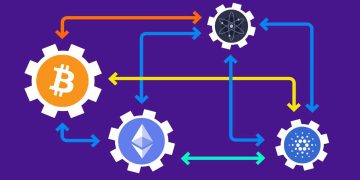Introduction
The digital transformation of global enterprises has become an urgent priority in today’s fast-evolving business landscape. From retail to logistics, manufacturing to finance, industries are embracing digital technologies to optimize operations, improve customer experiences, and drive growth. At the heart of this transformation lies a powerful and emerging technology: blockchain. While blockchain is most commonly associated with cryptocurrencies like Bitcoin and Ethereum, its applications extend far beyond digital currency. One of the most promising and practical use cases for blockchain is in the development of enterprise chains.
Enterprise chains, or private blockchains tailored for business applications, are quickly becoming the core infrastructure for the digitalization of global enterprises. With its decentralized nature, immutability, transparency, and ability to facilitate real-time, secure data exchanges, enterprise chains are set to revolutionize industries by streamlining operations, enhancing collaboration, and enabling more efficient decision-making processes. As organizations strive to create smarter, more efficient systems, the enterprise chain will become an essential tool in the digital transformation journey.
This article explores the role of enterprise chains in global business transformation, the benefits they offer, key examples of their application, and the future outlook for enterprise blockchain adoption. It will highlight how enterprise chains are shaping the future of industries by becoming the backbone of digital infrastructures, enabling businesses to remain competitive and adaptable in the digital era.
1. What are Enterprise Chains?
Enterprise chains, also referred to as private blockchains or permissioned blockchains, are blockchain networks specifically designed for use within organizations or by a consortium of trusted partners. Unlike public blockchains like Bitcoin, which are open to anyone, enterprise chains are often restricted to authorized participants, ensuring data privacy and compliance with regulatory requirements.
Key characteristics of enterprise chains include:
- Permissioned Access: Only authorized entities can participate, ensuring control over who can read and write data on the network.
- Data Privacy and Security: Enterprise chains implement stricter privacy protocols, such as encryption and tokenization, to safeguard sensitive business information.
- Scalability: These chains are designed to handle high transaction volumes and large amounts of data, making them suitable for enterprise-level operations.
- Efficiency: Faster transaction speeds are achievable through the use of consensus algorithms like Practical Byzantine Fault Tolerance (PBFT) or Delegated Proof of Stake (DPoS), which are more energy-efficient than Proof of Work (PoW).
Enterprise chains provide businesses with the ability to take advantage of blockchain’s immutable ledger, ensuring transparency, accountability, and traceability across business processes. They allow organizations to optimize their operations and enhance collaboration while maintaining privacy and control over sensitive data.
2. The Role of Enterprise Chains in Digital Transformation
2.1. Optimizing Supply Chain Management
Supply chain management (SCM) is one of the most prominent areas where enterprise chains are making an impact. Traditional supply chains are fragmented, involving multiple intermediaries such as manufacturers, suppliers, distributors, and retailers, each maintaining separate records. This fragmentation often leads to inefficiencies, delays, and errors, particularly when tracking goods and payments across borders.
Enterprise chains streamline the entire supply chain process by providing a single, immutable record of every transaction. With blockchain, every step—from raw material procurement to final delivery—can be tracked and verified in real-time. For example:
- Traceability: Blockchain enables end-to-end visibility of products, helping businesses track the origin of goods and ensuring quality and authenticity. This is especially important in industries such as food and pharmaceuticals, where product safety is paramount.
- Transparency: All parties in the supply chain have access to the same information, reducing disputes and errors caused by inconsistent records.
- Efficiency: Blockchain automates processes like payment processing, reducing reliance on manual intervention and intermediaries, thus lowering operational costs.
A notable example of blockchain in supply chain management is Walmart, which uses a blockchain-based system to track food products from farm to store. This solution not only enhances traceability but also ensures compliance with safety regulations and reduces the time it takes to trace food sources during recalls.
2.2. Improving Financial Transactions and Payments
Financial transactions are an essential aspect of business operations, and enterprises are increasingly looking for faster, more secure ways to process payments. Traditional banking systems, while widely used, are slow and expensive, especially for cross-border transactions. Blockchain’s decentralized and immutable nature provides an alternative that enhances transparency, reduces costs, and speeds up transactions.
Enterprise chains can be used for:
- Cross-border payments: Blockchain eliminates the need for intermediaries in international transactions, reducing fees and improving transaction speed. By using stablecoins or central bank digital currencies (CBDCs), enterprises can execute near-instantaneous payments globally with reduced exchange rate risks.
- Smart contracts: These self-executing contracts automatically enforce the terms of agreements once predefined conditions are met. For example, in a supply chain scenario, a smart contract can release payment to a supplier once the shipment arrives at a designated port, automatically ensuring compliance with the agreement.
Deutsche Bank and J.P. Morgan are examples of financial institutions exploring blockchain for cross-border payments. J.P. Morgan’s Onyx platform, for instance, facilitates instant interbank payments through a permissioned blockchain network, significantly reducing transaction times and costs.
2.3. Enhancing Data Management and Security
In the digital age, data is a valuable asset for businesses. However, managing data securely and efficiently remains a significant challenge. Many organizations struggle with issues like data breaches, unauthorized access, and inaccurate data across systems. Blockchain can play a critical role in improving data management by providing a secure, tamper-proof ledger for storing and sharing information.
Enterprise chains enable organizations to:
- Secure data storage: Sensitive data, such as customer records, financial information, and intellectual property, can be stored securely on a blockchain. The immutability of the blockchain ensures that the data cannot be altered or deleted without a record of the changes.
- Data sharing: Blockchain enables secure and transparent data sharing between trusted parties. This can improve collaboration across departments, partners, or even entire industries, while ensuring compliance with data privacy regulations such as GDPR.
For instance, the Health Information Trust Alliance (HITRUST) is using blockchain to create secure data-sharing frameworks for healthcare organizations. This technology ensures that patient data is protected, accessible, and compliant with healthcare regulations.
2.4. Boosting Governance and Compliance
Regulatory compliance is a significant concern for enterprises, especially in industries like finance, healthcare, and logistics, where stringent laws govern data privacy, financial reporting, and operational practices. Enterprise chains can enhance governance and ensure compliance by providing a transparent, auditable, and immutable record of all transactions.
Blockchain-based systems:
- Audit trails: Every action taken on a blockchain is recorded in a transparent, tamper-proof ledger, creating an easily accessible audit trail. This is valuable for meeting compliance requirements and can reduce the cost and complexity of audits.
- Regulatory reporting: Blockchain enables real-time access to accurate, verifiable data, simplifying the reporting process for regulatory bodies. This is particularly useful for financial institutions that must comply with financial reporting standards like the Basel III regulations.
An example is HSBC, which has been leveraging blockchain to improve compliance in its trade finance operations. The bank has implemented blockchain solutions to automate document verification processes, reducing the chances of errors and ensuring compliance with international trade regulations.

3. Key Benefits of Enterprise Chains for Digital Transformation
3.1. Increased Efficiency
Enterprise chains eliminate the need for intermediaries and manual processes, streamlining operations. Smart contracts, for example, automate complex workflows, reducing the time spent on administrative tasks and mitigating human error. Real-time access to information ensures that decisions are based on accurate and up-to-date data.
3.2. Reduced Costs
By removing intermediaries and minimizing the need for paperwork, enterprise chains can drastically reduce costs. Blockchain’s transparency and immutability also reduce the chances of fraud or disputes, which often result in costly legal fees and operational inefficiencies.
3.3. Enhanced Trust and Collaboration
Enterprise chains foster trust between stakeholders by ensuring transparency and security. Since all transactions are recorded on an immutable ledger, businesses can confidently share data with partners, suppliers, or customers. This enhances collaboration, reduces friction, and accelerates decision-making.
3.4. Scalability
As businesses grow, so do their operational needs. Enterprise chains are designed to handle high transaction volumes and complex data structures, making them scalable solutions for growing businesses. The flexibility of blockchain technology allows companies to scale their digital transformation efforts while maintaining data integrity and privacy.
4. The Future of Enterprise Chains in Global Digital Transformation
As blockchain technology matures and more businesses adopt enterprise chains, we can expect several key developments:
- Wider adoption across industries: Sectors such as finance, healthcare, retail, and logistics are already leveraging blockchain. As technology advances, more industries will integrate enterprise chains into their operations.
- Interoperability: The future will likely see increased interoperability between different blockchain networks, allowing businesses to seamlessly collaborate with partners across various industries and geographies.
- Government and regulatory frameworks: As blockchain adoption grows, we expect to see governments introduce more comprehensive regulatory frameworks to support enterprise blockchain initiatives while ensuring compliance with existing laws.
- AI and blockchain integration: The combination of blockchain and artificial intelligence (AI) could enable even more sophisticated business operations, allowing for predictive analytics, automation, and real-time decision-making based on secure data.
Conclusion
Enterprise chains are poised to become the backbone of digital transformation across industries, offering businesses the tools they need to streamline operations, enhance security, and collaborate more effectively. As blockchain technology continues to evolve and its adoption spreads, enterprise chains will increasingly serve as the core infrastructure for global enterprises, supporting a future where
businesses are more transparent, efficient, and resilient in the face of digital disruption.
Through blockchain, businesses can achieve greater efficiency, security, and collaboration—ultimately driving innovation and growth in the digital economy. The future of global enterprises is digital, and enterprise chains will be at the heart of that transformation.

















































